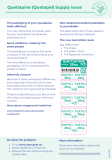If you're a frequent visitor to Healthify, why not share our site with a friend? Don't forget you can also browse Healthify without using your phone data.
Quetiapine
Sounds like 'kweh-tie-ah-peen'
Key points about quetiapine
- Quetiapine is used to treat bipolar disorder and schizophrenia.
- Quetiapine is also called Quetapel® or Seroquel®.
- Find out how to take it safely and possible side effects.

Quetiapine is used to treat schizophrenia and bipolar disorder. Quetiapine doesn't cure these conditions, but is used to help ease the symptoms and help you on your recovery path.
- It can help symptoms such as mania of bipolar disorder, the experience of hearing voices (hallucinations), ideas that distress you and don't seem to be based in reality (delusions), and difficulty in thinking clearly (thought disorder). It can also help with the depressive episodes associated with bipolar disorder.
- Quetiapine belongs to a group of medicines called antipsychotics. Read more about antipsychotic medicines and how they work.
In Aotearoa New Zealand quetiapine is available as tablets (25 mg, 100 mg, 200 mg, 300 mg).
- Always take your quetiapine exactly as your doctor has told you. The pharmacy label on your medicine will tell you how much quetiapine to take, how often to take it, and any special instructions.
- The dose of quetiapine is different for different people.
- Your doctor will start you on a low dose and increase it over a few days. This allows your body to get used to the medicine and reduces side effects
- Quetiapine is usually taken twice a day, for mania or schizophrenia, in the morning and evening. Take your quetiapine doses at the same times each day. If you are taking quetiapine for depression associated with bipolar disorder, take it once a day, at bedtime.
- You can take quetiapine with or without food. Don't take it with large quantities of grapefruit juice as it changes the levels of quetiapine causing side effects. Read more about grapefruit and medicines.
- If you forget to take your dose, take it as soon as you remember that day. But if it is nearly time for your next dose, just take the next dose at the right time. Don't take double the dose.
- Keep taking quetiapine every day. It usually takes a few weeks to start working and it can take several months before you feel the full benefits. Don't stop taking quetiapine suddenly as your symptoms may return if stopped too early. Talk to your doctor or nurse before stopping.
Here are some things to know when you're taking quetiapine. Other things may be important as well, so ask your healthcare provider what you should know about.
- Alcohol: Avoid alcohol while you are taking quetiapine, especially when you first start treatment. Alcohol can increase your risk of side effects such as dizziness and drowsiness.
- Driving: Quetiapine can make you sleepy and dizzy so be careful when driving or using tools until you know how it affects you.
- Other medicines: Quetiapine can interact with other medicines. Tell your doctor or pharmacist about all medicines you are taking including over the counter medicines, herbal and complementary medicines or recreational drugs.
- Quetiapine may cause changes in your blood glucose level, cholesterol level and heart function. Your doctor will check your physical health – you may need to have your weight and blood pressure (BP) measured regularly. You may also need blood tests to check your kidneys, liver, and cholesterol and glucose levels.
- Quetiapine is best avoided for people with certain medical conditions such as Parkinson’s disease, epilepsy and depression that is not associated with bipolar disorder and diabetes. Contact your doctor if you have or develop any of these conditions while taking it.
- Contact your doctor if you're pregnant or planning a pregnancy or if you are breastfeeding.
- Quetiapine can make your skin more sensitive to sunlight. Protect yourself, even on a bright but cloudy day; use sunscreen and wear a hat. Don't use sunbeds.
Like all medicines, quetiapine can cause side effects, although not everyone gets them. Often side effects improve as your body gets used to the new medicine.
| Side effects | What should I do? |
|---|---|
|
|
|
|
|
|
|
|
|
|
|
|
Read more about medicines and side effects and reporting a reaction you think might be a side effect.
The following links have more information on quetiapine. Be aware that websites from other countries may contain information that differs from Aotearoa New Zealand recommendations.
Med-ucation medication benefits & side effects(external link) Talking Minds, NZ
Quetapel(external link) Medsafe Consumer Information, NZ
Seroquel(external link) Medsafe Consumer Information, NZ
Quetiapine(external link) Patient Info, UK
Brochures
Medicines and side effects(external link) Healthify He Puna Waiora, NZ, 2024
Quetiapine (Quetapel) Supply issue(external link) Pharmac, NZ, 2025
5 questions to ask about your medications(external link) Health Quality and Safety Commission, NZ, 2019 English(external link), te reo Māori(external link)
References
- Quetiapine(external link) NZ Formulary, NZ
- Antipsychotic drugs(external link) NZ Formulary, NZ
Brochures

Medicines and side effects
Healthify He Puna Waiora, NZ, 2024

Health Quality and Safety Commission, NZ, 2019 English, te reo Māori
Credits: Sandra Ponen, Pharmacist, Healthify He Puna Waiora. Healthify is brought to you by Health Navigator Charitable Trust.
Reviewed by: Angela Lambie, Pharmacist, Auckland
Last reviewed:
Page last updated:






